A privilege to fly! Tom Allett spoke to Airbus test pilot Geri Krähenbühl who has the pleasure of displaying the Manching-based Messerschmitt 262 replica
They were once the most potent and feared weapon in the Luftwaffe’s inventory but today a Bavarian-based replica of the world’s first operational jet is a welcome visitor wherever it goes. The aircraft is D-IMTT ‘501244’ the second of five Messerschmitt Me 262 replicas built at Paine Field, USA, in the early 2000s. It is the only airworthy ‘262 in European skies and at the time of writing was about to appear as the star attraction at the Royal International Air Tattoo (RIAT), Fairford…
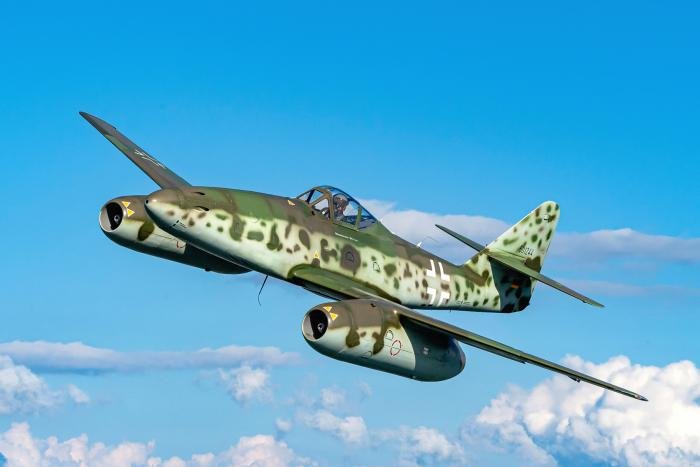
The aircraft is owned by the Messerschmitt Foundation, which flies it in conjunction with Airbus. It is based at the Messerschmitt Museum of Flight, one of the more recently built hangars inside the giant Airbus Defence and Space facility at Manching, an hour’s drive north of Munich.
Publishing deadlines required this article to go to press before the Air Tattoo, but assuming the ‘262 made it, it is surely a contender to be the rarest headline act in RIAT’s history, and that’s quite a statement given the event’s prestigious past.
If everything went to plan, I think it is fair to say by the time this edition hits the shops, a series of events will have combined to make the Messerschmitt’s visit the UK aviation event of the decade.
Portrait of a pilot
The display pilot for the UK venture is senior Airbus experimental test pilot Geri Krähenbühl. FlyPast was privileged to see ‘244 perform a practice display just days before it was scheduled to fly to the UK and, if everything went to plan, by the time these words are read it will have become the first of its type to fly in UK skies since 1946.
Obviously, it requires a huge effort from countless people across several organisations to bring ‘501244’ to the UK but Geri’s work will be centre stage for the public. He is a Swiss national and flew the Vampire (120 hours) and Hunter (700 hours) with the Swiss Air Force before carving out a career as an experimental test pilot, initially with the Swiss government before joining Airbus.
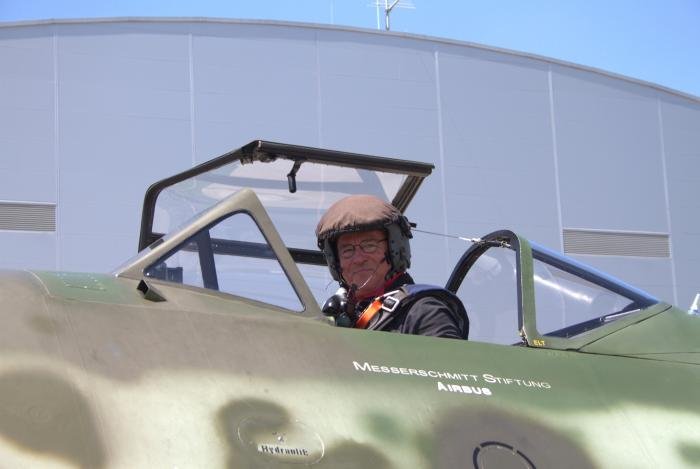
Among friends he is known as K12, which hails from a 1993 spell at a US test pilots’ school. Printing his 12-letter surname on flight suits was a problem. He explains: “They misspelt my name on the first one and then said, ‘we can’t spell it, we can’t pronounce it and we have no idea what it means, so we’re going to call you K12’ and that has remained my ‘callsign’ ever since!”
Geri retired from test flying the Eurofighter Typhoon and Panavia Tornado last year but still performs production testing on the Airbus A400M, A320 and A321, not bad for a boy who grew up wanting to be a shipbuilder. That all changed after buying a copy of Flug Revue aged 15. National Service was compulsory at that time and two years in the Swiss military led him to start his pilot training in 1984. After graduating, he flew the Hawker Hunter but decided against continuing as a career air force or airline pilot, opting to take a master’s degree at the Federal Institute of Technology, Zurich. It was a key step towards becoming a career test pilot.
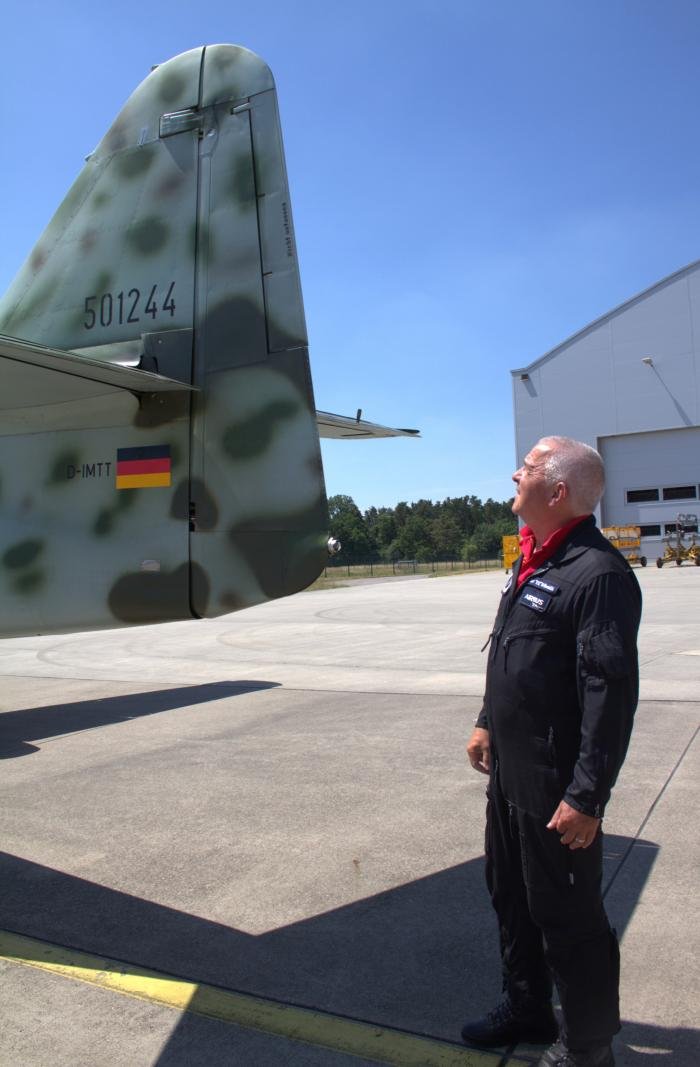
New blood
Geri joined the EADS company (later renamed Airbus) in December 2005. Just one year later he started flying the ‘262. He recalls: “[in 2006] Airbus was preparing the ‘262 to appear at the ILA Berlin Air Show. Two knowledgeable senior pilots were already flying the ‘262 so there was no opportunity for me. Then, by coincidence, an air force friend of mine sent me a photo of a T-bird [two-seat] 262 with my face stuck on it. I thought ‘I don’t think so!’
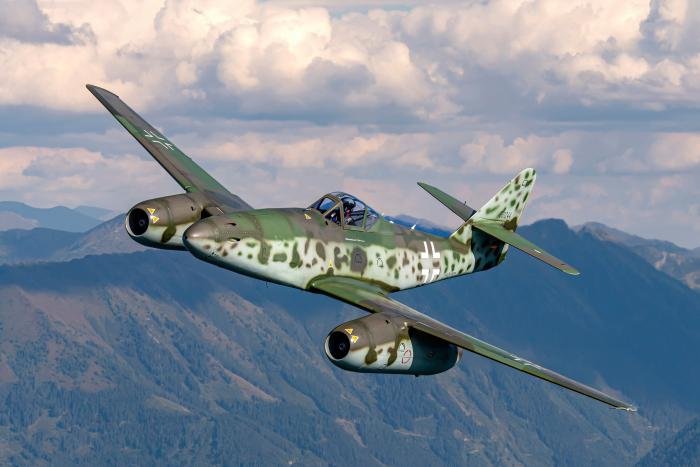
“But in 2010 the company pilots told me they needed new blood and asked if I was interested. I was surprised but delighted to be offered the opportunity and I have been flying the ‘262 ever since.”
Despite having accumulated 6,600 hours (4,500 on fast jets), which includes such impressive types as the F-15 Eagle, F-16 Fighting Falcon, F-18 Hornet, Eurofighter Typhoon and Panavia Tornado, his affection for the ‘262 shines through.
The ‘262 club’ is small with just two pilots current on the type in Germany, (Geri and fellow test pilot Thomas Braun) and up to four more that are current on the jet in the US. Geri notes: “We [pilots] are in contact with each other but we could never fly each other’s aircraft as each has different modifications. In the States they are still struggling with the FAA regulations concerning different brake configurations. I think maybe we have the best aircraft [of the five], right now. It has the best brakes, and everything is in really good shape.”
The Me 262 replicas are Permit to Fly (PTF) aircraft so there’s no type rating for a pilot’s licence; therefore, in Germany it is flown under an exception to Luftfahrt-Bundesamt (LBA) – the German CAA – rules. Geri explains that the pilots’ original PTF lasted for one year, but there was still the question of how to train new pilots. “When I was chief test pilot, I discussed this problem with the LBA. We don’t have a two-seater to train in, so I said I wanted to get to know the potential ‘262 pilots, consider if they were the right people for the job, and ultimately choose which ones are selected to fly it. I still have that [privilege] but, eventually, it will pass to someone else – maybe Tom Braun – but for the moment he is happy for me to take the heat with these decisions!”
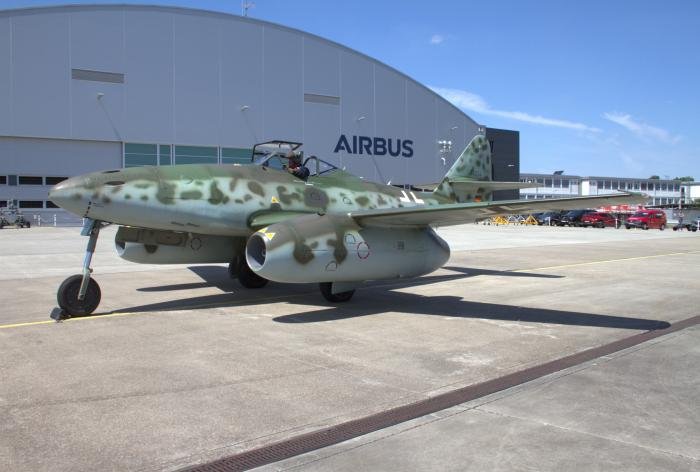
Geri adds: “It’s easier to convert someone with a test pilot’s background to the 262 because at test pilot school you learn to fly an aircraft by the book. You get a manual from an engineer and he or she tells you to ‘start the engine like that; there are the flaps levers,’ and so on. Then you’re in the cockpit, start the engines, monitor the instruments and when you’re happy you will taxi the aircraft. Eventually you will taxi at higher speeds and, when you feel comfortable, then you go for the first hop. You probably won’t raise the ‘gear’ on that trip; that can be done when you gain experience.”
Show routine
Geri devised the 262’s display routine himself and explains what a typical show involves. “The 262 wasn’t built for turning so controlling the velocity vector is quite difficult when it is close to the ground. We use ‘lazy eights’ to keep us in front of the public. We can do aileron rolls, they are no problem, and limited barrel rolls if the weather is suitable. Or [alternatively] just a steep climb with a roll at the top and then I descend again. People are interested in the shape of the aircraft and these [manoeuvres] allow us to present that efficiently.”
Given there’s no two-seat trainer available, is there another aircraft that handles like the ‘262? One that could give would-be pilots some useful experience as they progress towards flying the type? Geri replies: “That’s difficult because there are two big problems with the ‘262. One is the distance between its centre of thrust and the centre of gravity. Whenever you push the throttle forward or back it causes the aircraft to pitch. The other is that if the engines do not spool up uniformly you get a tremendous yaw because the tail is too small to let you counter it.”
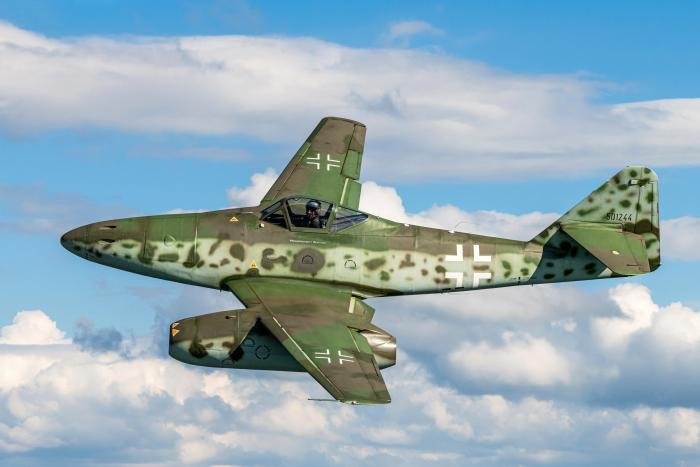
Recalling his previous flights in first-generation jets he notes: “The Vampire flies much more smoothly; it doesn’t pitch when you move the throttle, that’s down to the centre of gravity, but I don’t know how the Meteor compares; I haven’t flown one.
“The ‘262’s ‘problem’ is its design. It is an easy, cheap solution to travelling at high-speed. It can operate from -1 to +3g, but we stay within zero to +3g which is more than enough for air show displays.
“It was built for ‘hit and run’ fighting, not tight turns. It wasn’t suitable for dogfighting, so it’s quite difficult to display it to the public in terms of keeping it in front of the crowd. You cannot loop it at the kind of altitude you would be at in an air display. If you were inverted at the top of a loop and about to put the nose down you would be thinking, can I pull this through? The answer is no, the aerodynamic authority is just too small for that. That’s down to the aircraft’s configuration and there’s nothing similar out there that we can use to train for it.”
So, given its age and basic technology, is the Me 262 a ‘pleasure’ to fly, or would ‘interesting’ be a better description? Geri explains – with a smile on his face – “It’s like dancing with a woman. There are nights when you are ‘the star of the stage’. Everything is going smoothly; you are floating around, and it is wonderful. Then there are other nights when you tread on each other’s toes, that’s how flying the 262 is!” But who has the clumsy feet? “Both of us!” he quips.
Despite the ‘262’s characteristics Geri adds: “It’s great to fly an aircraft that greatly influenced aircraft design at the end of World War Two and for many years beyond. Swept wings, axial-flow engines, and a jet with a nosewheel were all new ideas at the time.”
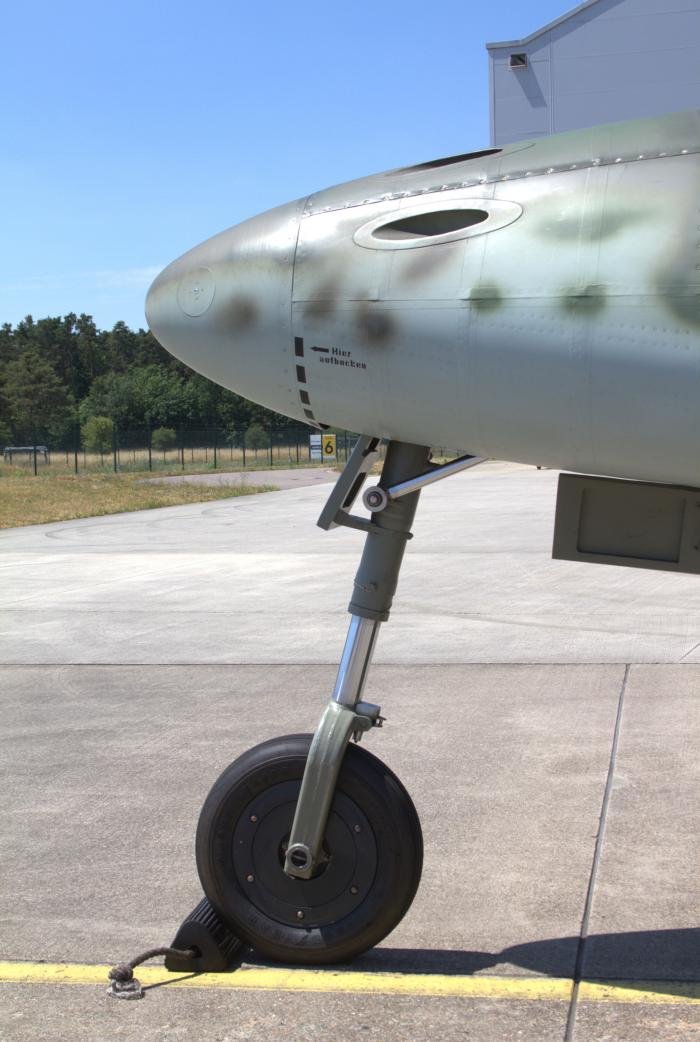
So, having flown 65 aircraft types so far, where does the Me 262 sit within his list of favourite types to fly? “I have to split them into different categories,” says Geri. “For sheer power it must be the Eurofighter Typhoon and [General Dynamics] F-111. For good handling it is the Hawker Hunter and [Douglas] A-4 Skyhawk. The ‘262 is also high on my list of favourites but each of these aircraft have a list of attributes that are not comparable to other types.”
Having completed 120 hours in ‘244, Geri is thought to be the most experienced 262 pilot of all time, exceeding even the flight hours achieved by those who flew the wartime aircraft operationally, although it is possible that the wartime production test pilots may have accumulated more.
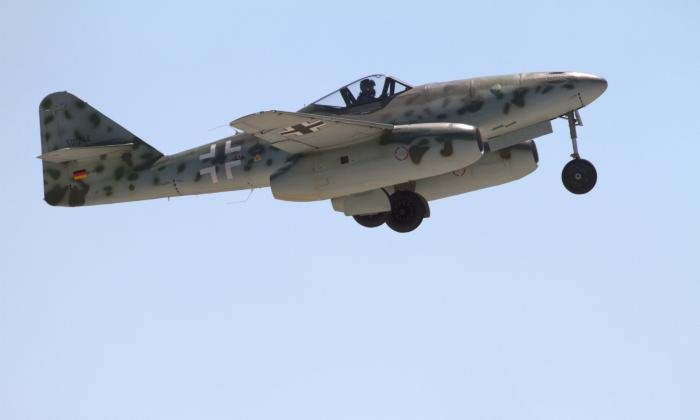
Comparisons, old and new
While speaking of pilots from the past, Geri recalls the occasion he met test pilot extraordinaire Eric ‘Winkle’ Brown, who had test flown captured Messerschmitt 262s after the war in Europe ended. “We had a Society of Experimental Test Pilots (SETP) meeting at the 2012 Berlin Symposium where I was the session chairman when Winkle gave a speech. He was barely able to deliver it because it generated so much conversation and questions about the ‘262!
“All the SETP members went to visit the Gatow airport museum that week and while there, a ‘262 and a ‘109 performed a flypast together and Winkle thought it was a real ‘wow’ moment.”
Geri has sat inside the Me 262 preserved at the Deutsches Museum, Munich. Considering the differences between ‘old and new’ he notes: “The replica’s cockpit instruments are ‘lookalikes’ close to the same size and position of those in the original aircraft, but there’s no gunsight.”
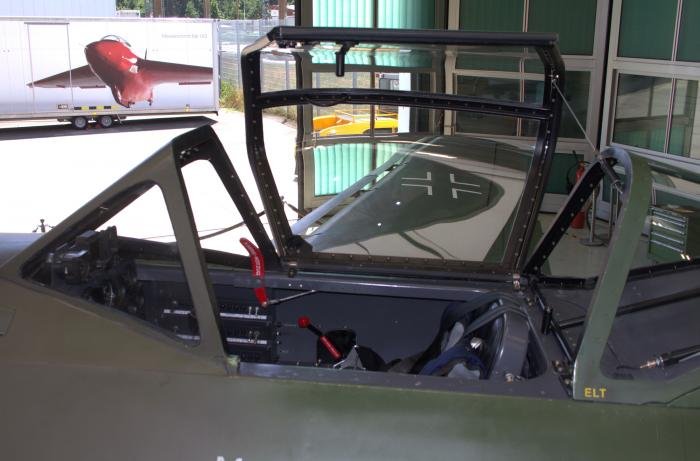
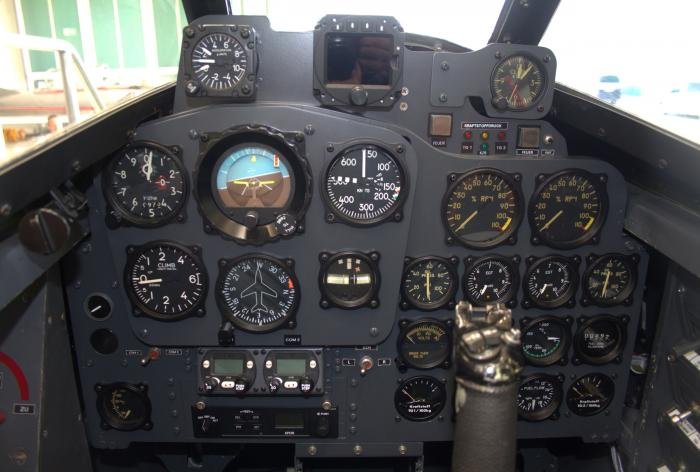
The shelf on the lower left-hand side, about where the pilot’s elbow would be is essentially as the original was, with a rudder trim wheel, fuel cocks, throttle quadrants, horizontal stabiliser trim and extend/retract buttons for the flaps and undercarriage. However, the opposite side has been redesigned. With no need for a bomb release or Indication Friend or Foe (IFF) system, the space has been used to accommodate a modern radio and engine start system.
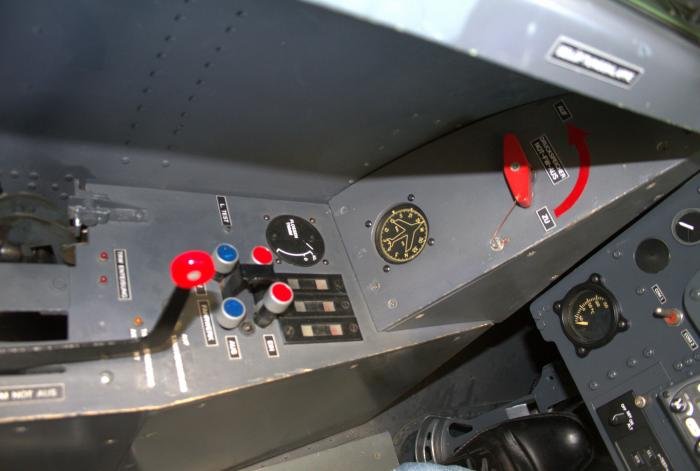
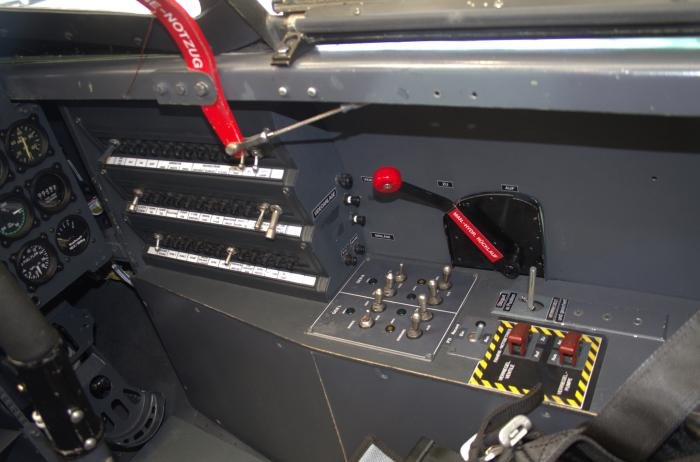
’262 and friends
In preparation for the UK visit, Geri completed his display authority flying and paperwork in front of Display Authority Examiner Eskil Amdal (a pilot with the Flying Bulls in Austria) at Manching in mid-June, receiving his ‘ticket’ at the beginning of July.
While displaying the 262 at RIAT would surely be another memorable occasion in his flying career, it won’t be his first Air Tattoo appearance as he flew the A400M there in 2019. Elsewhere on the airshow circuit he’s also performed several ‘’262 and friends’ flypasts. First a ‘262/ Messerschmitt 109, then a ‘262/Eurofighter Typhoon (both in Germany). These were followed by a ‘262/MiG-15 and a ‘262/Yak-3 combinations in the Czech Republic, and, in 2016, a 13-aircraft ‘Balbo’ at Pardubice (Czech Republic) that included a Mustang, Lightning, B-25, and PBY flying boat.
Looking ahead, he still has a few historic types on his Pilot in Command ‘bucket list’. Surprisingly, the US Navy’s long-retired A-5 Vigilante is top of it, but very unlikely given none are even close to being airworthy. More realistic is perhaps the F-104 Starfighter but other types of Messerschmitt do not feature.
Geri recalls: “I once had the privilege of a back seat ride in a Bf 109 but I’m not keen to fly that beast as the Pilot in Command. I have a lot of experience flying tail draggers like the Pilatus Porter, but the ‘109 is in a completely different league. Nobody likes the undercarriage. If we were to go back to having circular grass airfields again with 1km of runway maybe I would try it!”
Whatever the future holds, let us hope that we don’t have to wait another lifetime to see a Me 262 in UK skies again.


